theartsdesk in La Rochelle: Francofolies | reviews, news & interviews
theartsdesk in La Rochelle: Francofolies
theartsdesk in La Rochelle: Francofolies
Five days of all types Franco music on the French Atlantic coast
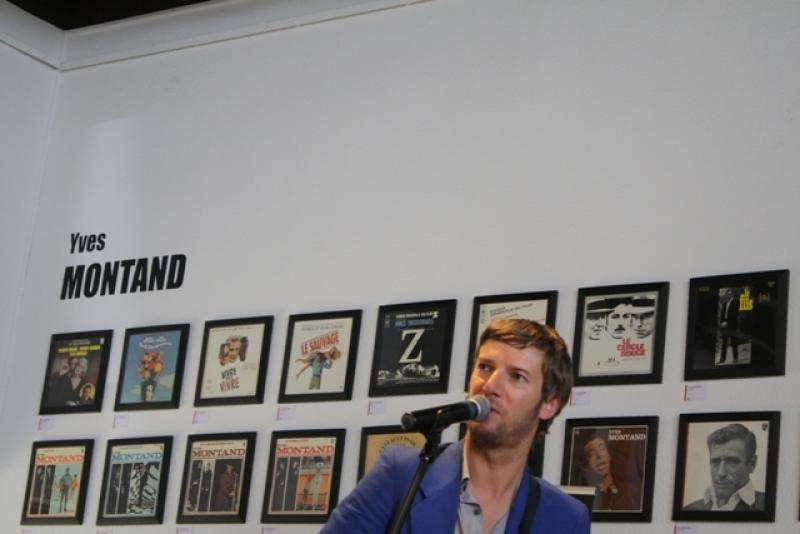
The French national holiday of 14 July might be marked by parades and fly-pasts in Paris, but here on the Atlantic coast it’s the central date for Francofolies, the annual festival dedicated to French music. La Rochelle hosted its first Francofolies in 1985. Twenty-six years on, the festival remains the premier showcase for Francophone music.
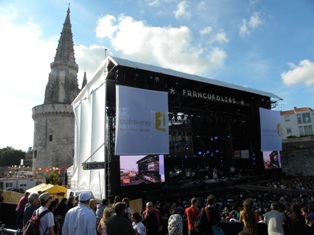 Not that the city itself isn’t memorable enough on its own. La Rochelle has been a harbour since the 1100s and became France’s largest medieval sea port. Evidence of its past is inescapable. Rue St-Sauveur sports half-timbered 14th-century buildings. The 15th-century Tour de la Lanterne, formerly used as a lighthouse and a prison, looms over the main outdoor Francofolies stage at Saint-Jean d’Acre site (pictured above right). It’s pretty hard to miss. The arcaded shopping streets of Rue du Palais and Rue des Merciers are spectacular too.
Not that the city itself isn’t memorable enough on its own. La Rochelle has been a harbour since the 1100s and became France’s largest medieval sea port. Evidence of its past is inescapable. Rue St-Sauveur sports half-timbered 14th-century buildings. The 15th-century Tour de la Lanterne, formerly used as a lighthouse and a prison, looms over the main outdoor Francofolies stage at Saint-Jean d’Acre site (pictured above right). It’s pretty hard to miss. The arcaded shopping streets of Rue du Palais and Rue des Merciers are spectacular too.
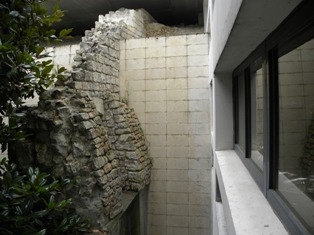 Sieges, wars and blockades regularly figure in the city’s history. It was even English for a while, after Henry II married Eleanor of Aquitaine in 1154. England lost control in 1224, and regained it for 12 years from 1360. Since then, the city has remained French. Our Henry built a castle and its forlorn remains survive in the Place de Verdun as part of an underground car park (pictured left). There are no signs, nothing explaining what these bits of masonry are. But there they are, forgotten in the stairwell leading down to the car park.
Sieges, wars and blockades regularly figure in the city’s history. It was even English for a while, after Henry II married Eleanor of Aquitaine in 1154. England lost control in 1224, and regained it for 12 years from 1360. Since then, the city has remained French. Our Henry built a castle and its forlorn remains survive in the Place de Verdun as part of an underground car park (pictured left). There are no signs, nothing explaining what these bits of masonry are. But there they are, forgotten in the stairwell leading down to the car park.
The 80,000 population of the city has its mind on other matters. The festival attracts over 150,000. Francofolies is spread across four sites. La Coursive, a fine colonnaded theatre that looks as though it'd be at home in Bath, has three performance spaces, all seated. West of the city centre, the Casino Barrière has a small club-like room. The two outdoor stages are the massive Saint-Jean d’Acre and the smaller, free, quayside Scène Horloge Rouge stage. Day and night shows there keep the festival humming, while the other stages and spaces are ticketed.
Shows at the Casino Barrière are self-consciously billed as “Not Ze Francos”. Even though part of the festival, the tacit acknowledgment of Francofolies being uncool seems weird. One of the La Coursive auditoriums runs a festival-long series of “Premières Francos” shows – artists who have never played the festival before. Each evening at Saint-Jean d’Acre is also loosely themed.
Who or what style plays Francofolies is pretty elastic. Bad boy Buju Banton and classic reggae outfit Toots and the Maytals cropped up in 2000. This year, a fair smattering of the French acts are singing in English and visitors from Québec, Belgium and Switzerland are here. The variety of musical styles – chanson Française, rap, techno, indie rock, old stagers, folkies - means it’s impossible to use the festival to take the temperature of French music. It’s a snapshot. A massive one.
Although Francofolies’ booking policy is inward-looking, the proximity to the tourist-attracting Ile de Ré means there are some Brits wandering La Rochelle’s streets. And there are acts playing the festival who’ve been heard of outside France. David Guetta is top of that small heap. His collaborations with and productions for Akon, Black Eyed Peas, Fergie, Madonna, Kylie Minogue, Kelly Rowland and more attest to his position. His own albums clean up, but it's impossible to tell how many non-French are in the festival’s audiences.
Guetta’s Saturday-night set at Saint-Jean d’Acre – following a torrential rainstorm - is received by a suitably bonkers crowd. As for his DJing skills, it’s hard to be swayed by someone who turns all the volume down to get the crowd singing along – doesn’t he have the technical whatsit to make only the vocal line drop out? Every now and then he dashes out from behind his console, hops Pacman-like across the lip of the stage, raises his arms and sprints back behind his machines. Twenty minutes is when the fun runs out for me, but I’m heavily outnumbered.
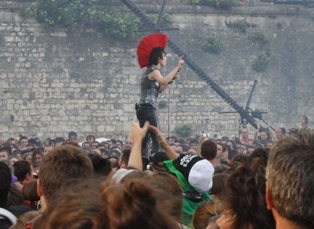 Wednesday night’s Saint-Jean d’Acre show is, although headlined by the internationally recognised Gotan Project, a more French-only affair. Acts playing are well known here, but mean little abroad. Jean-Louis Aubert is a veteran – his old band Téléphone were formed in 1976. His show is worthy, and terrifically dull. Thankfully he was preceded by Mademoiselle K and Zazie, two singers brimming with life. Nominally a band, Mademoiselle K is really Katherine Gierak, a Franco lady of rock (pictured right, photo by Louise Robert). Bonce topped with a Mohican made of feathers, she saunters into the crowd, making shapes. Her music is New Wave rock with shades of Elastica. The intro of one song might as well be The Only Ones' "Another Girl, Another Planet". Zazie has been around longer. After around 10 years as a swank fashion model she began singing publicly and issued the first of her self-produced albums in 1992. I wasn’t mad about her last album, 49 (not her age, but the amount of songs recorded during its sessions), but live she was terrific, straightforward, down to earth and engaging. “Aux armes citoyennes” is wonderful, a swoonsome classic. But singer Axel Baeur joins her for the duet “A ma place” and the spell is broken. He looks like Spiral’s Parisian cop Gilou, and sings about as well as you’d expect Gilou to.
Wednesday night’s Saint-Jean d’Acre show is, although headlined by the internationally recognised Gotan Project, a more French-only affair. Acts playing are well known here, but mean little abroad. Jean-Louis Aubert is a veteran – his old band Téléphone were formed in 1976. His show is worthy, and terrifically dull. Thankfully he was preceded by Mademoiselle K and Zazie, two singers brimming with life. Nominally a band, Mademoiselle K is really Katherine Gierak, a Franco lady of rock (pictured right, photo by Louise Robert). Bonce topped with a Mohican made of feathers, she saunters into the crowd, making shapes. Her music is New Wave rock with shades of Elastica. The intro of one song might as well be The Only Ones' "Another Girl, Another Planet". Zazie has been around longer. After around 10 years as a swank fashion model she began singing publicly and issued the first of her self-produced albums in 1992. I wasn’t mad about her last album, 49 (not her age, but the amount of songs recorded during its sessions), but live she was terrific, straightforward, down to earth and engaging. “Aux armes citoyennes” is wonderful, a swoonsome classic. But singer Axel Baeur joins her for the duet “A ma place” and the spell is broken. He looks like Spiral’s Parisian cop Gilou, and sings about as well as you’d expect Gilou to.
Thursday's nominally indie-folk night at Saint-Jean d’Acre centred on the reflective acoustic Cocoon, who drop a version of Outkast's "Hey Ya" into their set. After them, Yodelice takes the stage. He’s been around for ages and goes through trends like salt. I was told he's gone folk. If folk is a French Eddie Vedder with a stuck-in-first-gear Pearl Jam as the band, then so be it. Way better are the arty indie combo The Dø, who hurtle through tune after tune in the way that any good pop group ought to.
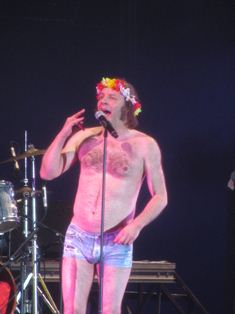 On the Saturday, David Guetta was preceded by the snappy electropop of Yelle, romping through the recent Safari Disco Club album. Bright and fun, it's perfect for the seaside setting. Front woman Julie Budet never stops. They sound oddly Scandinavian; Sweden's Robyn springs to mind. However, the festival’s oddest act comes between Yelle and David Guetta. Philippe Katerine is one of France’s most idiosyncratic and – generally – engaging artists (pictured left, photo by David McKenna). His 2005 album, Robots après tout, was a spiffy electro-led fantasia. Before that, 2002’s 8ème ciel was an extraordinary semi-psychedelic concept piece with whimsical made-up characters. Unreality and artifice are at the centre of his persona. But his recent eponymous set was a farrago. “La Reine d’Angleterre” borrowed “Land of Hope and Glory”'s melody, over which he sang “Je suis la Reine de l‘Angleterre… Hello, I am the queen of kingdom and I am shitting on your face, I am because I am shitting on your face because the world is perfect”. “Bisou” built to “…fuck off, I’m going to smash your face… when we say fuck off what do we expect?” Art maybe, but not worth listening to, especially with the context of his previous releases. He’s a national treasure, and humoured. So his silly Francofolies set (performed in a downpour) was well received. But, for me, sadly, it’s time to cut the reins.
On the Saturday, David Guetta was preceded by the snappy electropop of Yelle, romping through the recent Safari Disco Club album. Bright and fun, it's perfect for the seaside setting. Front woman Julie Budet never stops. They sound oddly Scandinavian; Sweden's Robyn springs to mind. However, the festival’s oddest act comes between Yelle and David Guetta. Philippe Katerine is one of France’s most idiosyncratic and – generally – engaging artists (pictured left, photo by David McKenna). His 2005 album, Robots après tout, was a spiffy electro-led fantasia. Before that, 2002’s 8ème ciel was an extraordinary semi-psychedelic concept piece with whimsical made-up characters. Unreality and artifice are at the centre of his persona. But his recent eponymous set was a farrago. “La Reine d’Angleterre” borrowed “Land of Hope and Glory”'s melody, over which he sang “Je suis la Reine de l‘Angleterre… Hello, I am the queen of kingdom and I am shitting on your face, I am because I am shitting on your face because the world is perfect”. “Bisou” built to “…fuck off, I’m going to smash your face… when we say fuck off what do we expect?” Art maybe, but not worth listening to, especially with the context of his previous releases. He’s a national treasure, and humoured. So his silly Francofolies set (performed in a downpour) was well received. But, for me, sadly, it’s time to cut the reins.
Thankfully, most of Francofolies is more straightforward. The La Coursive Premières Francos strand was striking. Rover is a leather-jacketed chap who fronts a band. His voice, when high, is Thom Yorke's. When low, he could be David Bowie. Good then, that he sings in English. Musically, it’s a nice mish-mash of Jeff Buckley, Radiohead and early Verve. Cyril Mokaiesh appears to think he’s The Waterboys. Lise was more off the wall. At a grand piano she played like Chopin, sang like Arletty and told song-stories about being made of ice and melting. In a cut-down Miss Havisham dress she described her hair as feathers. Frànçois and the Atlas Mountains (signed to the British label Domino) were fun, a harmony-pop take on Animal Collective with some high life chucked in. Bertrand Belin was already familiar, from La Rochelle's sister Francofolies festival in Montréal. His La Rochelle show was superb. Although the French audience tends to concentrate on his lyrics, his jazzy yet New York-influenced (Television, Velvet Underground) guitar playing is hypnotic. He is reinventing, recontextualising chanson. At a small reception for the festival, he even tackled the songs of Yves Montand in this singular style. Belin, a former member of Sons of the Desert, was the pick of La Coursive’s Premières Francos shows.
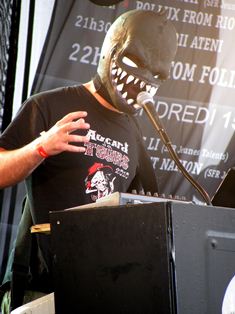 A 15-minute walk from La Coursive turns up at the Casino Barrières, a seaside fun palace. A small hall within it, Le Diane’s is about the size of north London’s Garage. Here, at the Not Ze Francos shows, the French indie dream took over, with lots of singing in English. The Bewitched Hands were sort-of Weezer. HushPuppies (nice Anglo name) were Menswear via "Parklife" Blur. The Inspector Cluzo were a nightmare version of The Black Keys without the blues, the songs and the charisma. Still, they seemed to be jolly amused. Janski Beeats is a one-man techno type. His mainly programmed set might as well be a video-game soundtrack. He also played an outdoor lunchtime show at Scène Horloge Rouge and, in his monster mask, didn’t impress the four-year-old kids in the crowd (pictured right, photo by David McKenna). The most amazing Casino show came from Le Prince Miiaou, the musical name of Maud-Elisa Mandeau. Her supremely unsunny outlook is on show in songs like “Could You Please Die” and “Everything Must be Erased”. “I want to kiss the birds, rub my secrets on their feathers… do the pigeons know how bad this is?” she sings on “I Don’t Know my Name”. But the floppy, tempo-shifting drumming (despite a click track) and clichéd, gurning, galumphing guitarist (another Gilou lookalike) do not serve her well. Charismatic and assured live, she begs to be supported by a band that do her justice.
A 15-minute walk from La Coursive turns up at the Casino Barrières, a seaside fun palace. A small hall within it, Le Diane’s is about the size of north London’s Garage. Here, at the Not Ze Francos shows, the French indie dream took over, with lots of singing in English. The Bewitched Hands were sort-of Weezer. HushPuppies (nice Anglo name) were Menswear via "Parklife" Blur. The Inspector Cluzo were a nightmare version of The Black Keys without the blues, the songs and the charisma. Still, they seemed to be jolly amused. Janski Beeats is a one-man techno type. His mainly programmed set might as well be a video-game soundtrack. He also played an outdoor lunchtime show at Scène Horloge Rouge and, in his monster mask, didn’t impress the four-year-old kids in the crowd (pictured right, photo by David McKenna). The most amazing Casino show came from Le Prince Miiaou, the musical name of Maud-Elisa Mandeau. Her supremely unsunny outlook is on show in songs like “Could You Please Die” and “Everything Must be Erased”. “I want to kiss the birds, rub my secrets on their feathers… do the pigeons know how bad this is?” she sings on “I Don’t Know my Name”. But the floppy, tempo-shifting drumming (despite a click track) and clichéd, gurning, galumphing guitarist (another Gilou lookalike) do not serve her well. Charismatic and assured live, she begs to be supported by a band that do her justice.
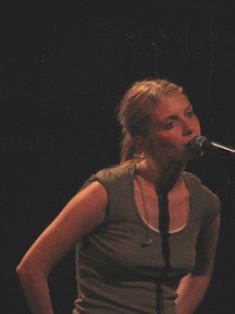 The big-ticket shows at La Coursive included Stupeflip, headlining on Wednesday. Their tiresome comedy rap dwells on dope, dope and dope. Friday gave a stage to Mélanie Laurent, the actress best known from Quentin Tarantino's Inglorious Basterds (pictured left, photo by David McKenna). She’s made an album with Damien Rice and looks uncomfortable on stage. Her pipsqueak voice wasn’t too super. The next night found the same stage occupied by Elodie Frégé, a graduate of TV talent show Star Academy. Dance-trained and music-schooled, she soon found her own path. Her terrific last album, La fille de l’aprés-midi, was intimate modern French pop of a type that can't exist elsewhere. However, live, that warmth was lost, and the keyboard player pushing the trip-hop button too often undermined these fragile and reflective songs.
The big-ticket shows at La Coursive included Stupeflip, headlining on Wednesday. Their tiresome comedy rap dwells on dope, dope and dope. Friday gave a stage to Mélanie Laurent, the actress best known from Quentin Tarantino's Inglorious Basterds (pictured left, photo by David McKenna). She’s made an album with Damien Rice and looks uncomfortable on stage. Her pipsqueak voice wasn’t too super. The next night found the same stage occupied by Elodie Frégé, a graduate of TV talent show Star Academy. Dance-trained and music-schooled, she soon found her own path. Her terrific last album, La fille de l’aprés-midi, was intimate modern French pop of a type that can't exist elsewhere. However, live, that warmth was lost, and the keyboard player pushing the trip-hop button too often undermined these fragile and reflective songs.
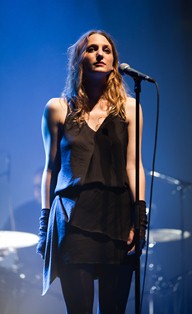 The performer preceding Laurent knew exactly how to take the chanson tradition and bring it into the now without undermining it. Raphaële Lannadère trades musically as L (pictured right, photo by JM Patron). Her debut album, Initiale, has a darkness that takes her close to Nick Cave and Tom Waits, but she's grounded in Leo Ferré and Barbara. She was awarded the Canadian Prix Félix-Leclerc earlier in the week, given to French-language singer-songwriters. Her four-piece band subtly underpinned the songs, and stood back – physically and musically. This was about the whole. The melodic “A Chateau Rouge” paints pictures of “le rêve des dealers de banlieue”. “Jalouse” is lightly jazzy. It was a mesmerising, understated performance.
The performer preceding Laurent knew exactly how to take the chanson tradition and bring it into the now without undermining it. Raphaële Lannadère trades musically as L (pictured right, photo by JM Patron). Her debut album, Initiale, has a darkness that takes her close to Nick Cave and Tom Waits, but she's grounded in Leo Ferré and Barbara. She was awarded the Canadian Prix Félix-Leclerc earlier in the week, given to French-language singer-songwriters. Her four-piece band subtly underpinned the songs, and stood back – physically and musically. This was about the whole. The melodic “A Chateau Rouge” paints pictures of “le rêve des dealers de banlieue”. “Jalouse” is lightly jazzy. It was a mesmerising, understated performance.
Later that evening, David Guetta would bring on the Euro-dance less than five minutes walk away. The best music festivals are about contrasts. Some are about that more than others. With Francofolies 2011 the contrasts weren’t limited to the music. This beautiful, coastal city is able to deal with the festival and retain its character. Sure, there’s a lot of tourist tat, human statues and cookie-cutter seafood restaurants. Francofolies and La Rochelle exist side by side. Dipping in and out of each is fine. It’s a bargain they’ve struck, and both benefit from it.
Add comment
The future of Arts Journalism
You can stop theartsdesk.com closing!
We urgently need financing to survive. Our fundraising drive has thus far raised £49,000 but we need to reach £100,000 or we will be forced to close. Please contribute here: https://gofund.me/c3f6033d
And if you can forward this information to anyone who might assist, we’d be grateful.

Subscribe to theartsdesk.com
Thank you for continuing to read our work on theartsdesk.com. For unlimited access to every article in its entirety, including our archive of more than 15,000 pieces, we're asking for £5 per month or £40 per year. We feel it's a very good deal, and hope you do too.
To take a subscription now simply click here.
And if you're looking for that extra gift for a friend or family member, why not treat them to a theartsdesk.com gift subscription?
more New music
 Music Reissues Weekly: Evie Sands - I Can’t Let Go
Diligent, treasure-packed tribute to one of Sixties’ America’s great vocal stylists
Music Reissues Weekly: Evie Sands - I Can’t Let Go
Diligent, treasure-packed tribute to one of Sixties’ America’s great vocal stylists
 'Deadbeat': Tame Impala's downbeat rave-inspired latest
Fifth album from Australian project grooves but falls flat
'Deadbeat': Tame Impala's downbeat rave-inspired latest
Fifth album from Australian project grooves but falls flat
 Heartbreak and soaring beauty on Chrissie Hynde & Pals' Duets Special
The great Pretender at her most romantic and on the form of her life
Heartbreak and soaring beauty on Chrissie Hynde & Pals' Duets Special
The great Pretender at her most romantic and on the form of her life
 The Last Dinner Party's 'From the Pyre' is as enjoyable as it is over-the-top
Musically sophisticated five-piece ramp up the excesses but remain contagiously pop
The Last Dinner Party's 'From the Pyre' is as enjoyable as it is over-the-top
Musically sophisticated five-piece ramp up the excesses but remain contagiously pop
 Moroccan Gnawa comes to Manhattan with 'Saha Gnawa'
Trance and tradition meet Afrofuturism in Manhattan
Moroccan Gnawa comes to Manhattan with 'Saha Gnawa'
Trance and tradition meet Afrofuturism in Manhattan
 Soulwax’s 'All Systems Are Lying' lays down some tasty yet gritty electro-pop
Belgian dancefloor veterans return to the fray with a dark, pop-orientated sound
Soulwax’s 'All Systems Are Lying' lays down some tasty yet gritty electro-pop
Belgian dancefloor veterans return to the fray with a dark, pop-orientated sound
 Music Reissues Weekly: Marc and the Mambas - Three Black Nights Of Little Black Bites
When Marc Almond took time out from Soft Cell
Music Reissues Weekly: Marc and the Mambas - Three Black Nights Of Little Black Bites
When Marc Almond took time out from Soft Cell
 Album: Mobb Deep - Infinite
A solid tribute to a legendary history
Album: Mobb Deep - Infinite
A solid tribute to a legendary history
 Album: Boz Scaggs - Detour
Smooth and soulful standards from an old pro
Album: Boz Scaggs - Detour
Smooth and soulful standards from an old pro
 Emily A. Sprague realises a Japanese dream on 'Cloud Time'
A set of live improvisations that drift in and out of real beauty
Emily A. Sprague realises a Japanese dream on 'Cloud Time'
A set of live improvisations that drift in and out of real beauty
 Trio Da Kali, Milton Court review - Mali masters make the ancient new
Three supreme musicians from Bamako in transcendent mood
Trio Da Kali, Milton Court review - Mali masters make the ancient new
Three supreme musicians from Bamako in transcendent mood
 Hollie Cook's 'Shy Girl' isn't heavyweight but has a summery reggae lilt
Tropical-tinted downtempo pop that's likeable if uneventful
Hollie Cook's 'Shy Girl' isn't heavyweight but has a summery reggae lilt
Tropical-tinted downtempo pop that's likeable if uneventful

Comments
...